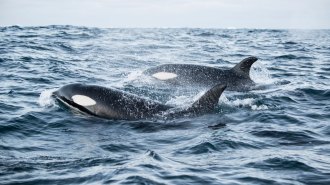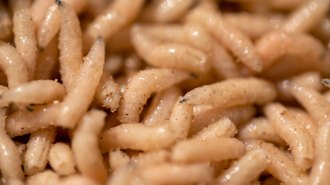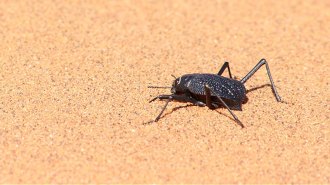News
-
 Health & Medicine
Health & MedicineYou may already have some protection from bird flu, but don’t count on it
Studies suggest that people who had seasonal flus or vaccinations have low antibody levels against H5N1 bird flu.
-
 Health & Medicine
Health & MedicineSeeing sick faces may prime the immune system to repel invaders
Seeing sick-looking faces in virtual reality triggers brain circuit changes related to threat detection and boosts activity of certain immune cells.
By Simon Makin -
 Animals
AnimalsSome killer whales hunt in pairs to maximize their bounty
Drone footage from Norway shows killer whales using a highly coordinated and cooperative hunting technique to catch herring.
-
 Archaeology
ArchaeologyMaggots may have been on the Neandertal menu
Maggots on rotting meat may have given Neandertals’ a fatty, nitrogen-rich boost, a study of their bones suggests.
-
 Animals
AnimalsThis desert beetle runs to cool off
After a sprint, the temperature of the beetle Onymacris plana drops. Efficient running, a body built for cooling and a little bit of lift all help.
- Health & Medicine
AI is designing proteins that could help treat cancer
A team used generative AI to enhance T cells’ ability to fight melanoma. The immunotherapy approach needs more testing before use in cancer patients.
By Meghan Rosen -
 Health & Medicine
Health & MedicineAn injected gel could make drugs like Ozempic last longer
GLP-1 drugs for diabetes and weight loss are difficult for some people to inject weekly. A new slow-release gel, tested in rats, could help.
By Meghan Rosen -
 Health & Medicine
Health & MedicineHow many steps a day do you really need to take?
An analysis of 57 studies shows that people who walked a certain number of steps were less likely to die from any cause compared with those who walked less.
By Skyler Ware -
 Health & Medicine
Health & MedicineClimate change may be pushing fungal allergy season earlier
Rising temperatures and changing rainfall patterns may be lengthening fungal allergy season, which starts 3 weeks earlier than it did two decades ago.
-
 Archaeology
ArchaeologyAI reveals new details about a famous Latin inscription
An analysis of the Res Gestae Divi Augusti using AI reveals its legal tone and imperial messaging, offering new insights missed by historians.
By Tom Metcalfe -
 Humans
HumansForget discrete droplets. This is how sweat really forms
The most-detailed look yet at how we perspire reveals that beads of sweat are out, puddling is in.
-
 Science & Society
Science & SocietyScreen addiction affects teens’ mental health. How to spot it, and help
Banning screens is often not an option. So Science News spoke with experts studying screen use and addiction in teens to help families navigate this complex issue.
By Sujata Gupta